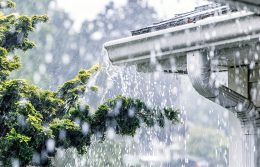Chimney Cleaning 101
For many, the words “chimney sweep” evoke images of a cheery, soot-covered man tap dancing on rooftops across London. But chimney sweeps are more than the beloved character of a classic Disney musical number — they’re professionals ensuring your chimney stays a source of warmth and comfort through winter, as opposed to a fire hazard.
It’s important to have your chimney regularly inspected and swept to ensure it functions properly. Song and dance are optional.
Why Is a Clean Chimney Important?
According to the National Fire Protection Association, the leading factor contributing to home heating fires is failure to clean the heating equipment (primarily chimneys). Getting your chimney cleaned is important for ensuring the safety of you and your family. When creosote, a byproduct of burning wood, accumulates in the chimney, it can ignite and cause a fire. A chimney sweep can remove this buildup, reducing the risk of a chimney fire.
What Will a Chimney Inspection Do?
Chimney inspections are also important because they can identify any problems with your chimney, such as cracks or damage, that could cause it to malfunction or become unsafe. For example, a cracked chimney liner can allow carbon monoxide and other dangerous gases to leak into your home, which can be deadly. A chimney sweep or inspector can identify and repair these issues before they become a serious problem.
How Often Should You Clean Your Chimney?
The frequency of inspections and sweepings will depend on several factors, including:
- The type of fuel you use in your fireplace or stove.
- The age and condition of your chimney.
- The amount of use your chimney gets.
As a general rule, wood-burning chimneys should be inspected at least once a year and swept as needed. If you use your fireplace or wood-burning stove frequently, you may need to sweep it more often. Gas-fired chimneys typically do not need to be swept as often, but they should still get inspected at least once a year to ensure they are safe and in good repair.
Does Your Chimney Require Extra Care?
Chimneys with tight bends or narrow flues can be more challenging to clean and may need to be swept more often. Similarly, chimneys that are used to vent appliances, such as furnaces or boilers, may need to be inspected and cleaned more frequently due to the higher levels of combustion byproducts they produce.
How Do You Spot Warning Signs?
If you notice any of the following, have your chimney checked out by a professional:
- A strong smell of smoke in your home, even when the fireplace is not in use.
- Soot or creosote buildup on the inside of the fireplace or on the damper.
- Visible cracks or damage to the chimney or fireplace.
- Difficulty starting or maintaining a fire in the fireplace.
- Smoke or gases backing up into the room when the fireplace is in use.
What If Someone Has Moved In?
If you’re hearing noises in your chimney and it doesn’t sound like Santa, but more like a chirping or chittering, you may have someone nesting in your chimney. It’s important that you contact a wildlife rehabilitator before attempting a wildlife rescue on your own. These trained professionals will be able to safely move wildlife without endangering them — or you and your home.
What Do I Do Now?
If you just moved into a new home with a chimney, or it’s been a year since yours had a good scrub, schedule an inspection and cleaning before lighting a fire.
Do you know the ins and outs of wood-burning fireplace and stove safety? Find our full guide here.
© 2023 Texas Farm Bureau Insurance



